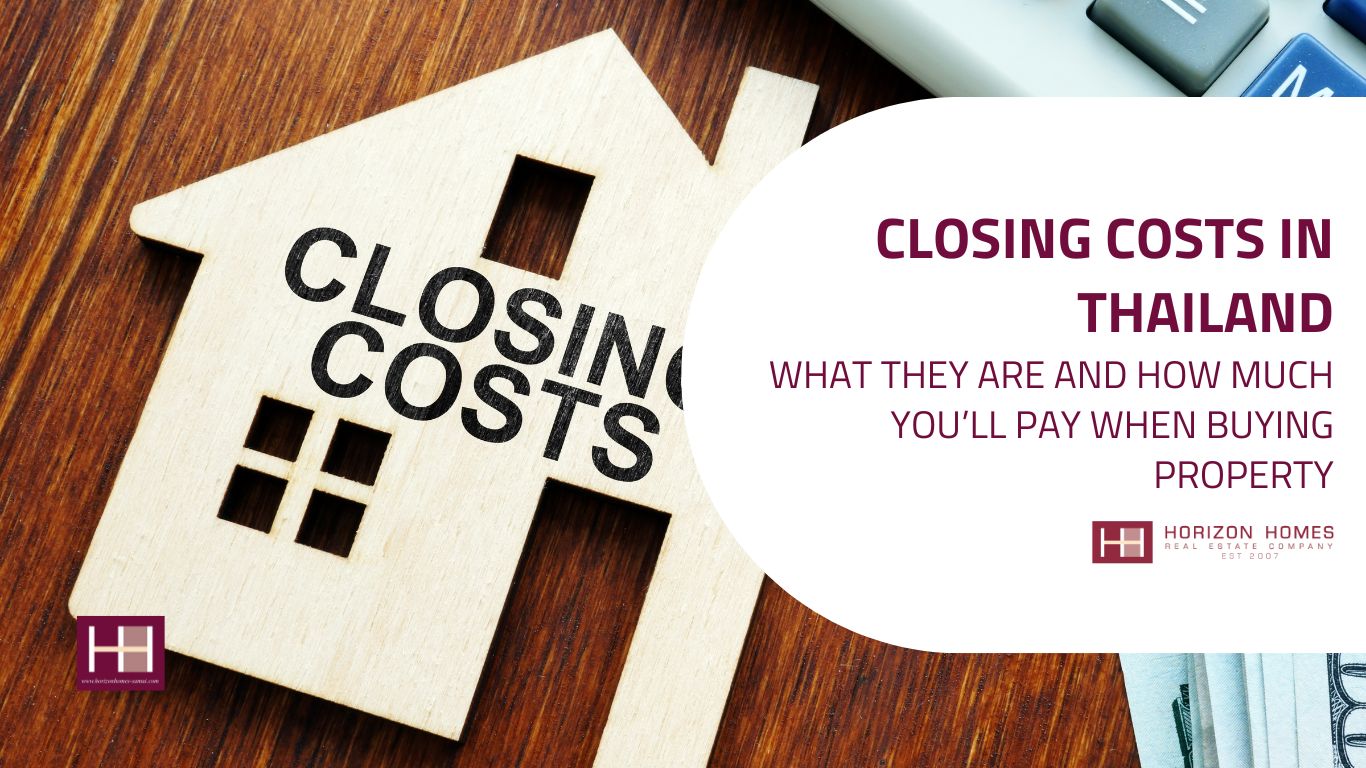When purchasing property in Thailand, your costs extend beyond the purchase price. Closing costs—including fees for property transfer, legal services, and taxes—are essential in finalizing a real estate transaction. For both first-time buyers and seasoned investors, understanding these costs can help avoid unexpected expenses and support more accurate budgeting.
This guide explains typical closing costs in Thailand for both buyers and sellers, breaks down costs by region, answers common questions, and offers expert tips for managing these expenses effectively.
What Are Closing Costs and Why Are They Important in Thailand?
In Thailand, closing costs cover essential fees for completing property transactions, including property transfer taxes, legal fees, and document processing costs. Generally, these costs range from 5% – 7% of the property’s purchase price, with exact percentages depending on property type, ownership structure, and regional requirements. By understanding these costs, buyers can budget more accurately, navigate negotiations, and even reduce expenses with strategic planning.
Key Benefits of Understanding Closing Costs
- Accurate Budgeting: Planning for closing costs prevents unexpected fees.
- Negotiation Leverage: Knowledge of costs helps buyers negotiate more effectively.
- Profit Calculation: Essential for real estate investors calculating ROI.
How Much Are Closing Costs in Thailand?
Average Closing Costs by Region in Thailand
| Region | Avg. Closing Costs (With Transfer Fees and Taxes) | Avg. Closing Costs (Without Transfer Fees and Taxes) |
| Bangkok | ฿400,000 – ฿600,000 (5% – 6% of property value) | ฿200,000 – ฿300,000 |
| Chiang Mai | ฿250,000 – ฿400,000 (4% – 5% of property value) | ฿150,000 – ฿250,000 |
| Phuket | ฿450,000 – ฿700,000 (6% – 7% of property value) | ฿300,000 – ฿450,000 |
| Pattaya | ฿350,000 – ฿500,000 (5% – 6% of property value) | ฿200,000 – ฿350,000 |
| Hua Hin | ฿300,000 – ฿450,000 (4.5% – 5.5% of property value) | ฿150,000 – ฿300,000 |
Typical Closing Costs in a Thai Real Estate Transaction
1. Transfer and Property Taxes
- Transfer Fee: Usually 2% of the appraised property value and commonly shared between buyer and seller.
- Specific Business Tax (SBT): Applicable if the property is sold within five years; 3.3% of the selling price or appraised value.
- Stamp Duty: 0.5% of the appraised property value if SBT doesn’t apply.
2. Legal and Title Fees
- Legal Fees: Essential for due diligence, contract review, and transaction processing, ranging from 20,000 to 50,000 THB based on property complexity.
- Title Search and Ownership Verification: Often included within legal services, ensures that the seller holds a clear and transferable title.
3. Loan-Related Fees (for Mortgage Buyers)
- Application and Loan Arrangement Fees: Usually around 1% of the loan amount; can vary depending on the lender.
- Mortgage Registration Fee: 1% of the loan amount, paid to the Land Department.
- Insurance: Property insurance and sometimes life insurance are required as part of the loan terms.
4. Appraisal and Inspection Fees
- Appraisal Fee: Ordered by banks to determine the property’s current market value, generally costing between 3,000 and 7,000 THB.
- Inspection Fees: Some buyers request optional inspections for older properties, which may add 2,000 to 5,000 THB to closing costs.
5. Prepaid Costs and Deposits
- Escrow Accounts: While not always required in Thailand, escrow is recommended for international buyers, with setup fees of around 1% of the transaction value.
- Homeowners Insurance: Banks may require a full year’s insurance upfront for financed properties, typically costing about 5,000 to 15,000 THB.
Who Pays Closing Costs in Thailand? Buyer or Seller?
In Thailand, both buyers and sellers share certain closing costs. Here’s a typical breakdown:
- Buyer Costs: Primarily cover legal fees, loan arrangement fees (if applicable), appraisal fees, and any prepaid costs.
- Seller Costs: Generally responsible for paying the specific business tax (if applicable), half of the transfer fee, and any outstanding taxes.
In some transactions, particularly in negotiated deals, the seller may agree to cover a larger share of transfer fees, especially in a buyer’s market.
Negotiation Potential
Buyers can negotiate with sellers to cover more of the transfer fees and even legal costs, particularly in markets where buyers have more leverage.
How to Reduce Closing Costs in Thailand
- Shop for Legal Services: Legal fees can vary widely, so compare costs among qualified attorneys to find competitive rates.
- Negotiate Seller Contributions: In a buyer’s market, request that the seller cover a higher share of the transfer fees or other costs.
- Review Your Costs in Advance: Request an itemized list of all expected fees early in the process to avoid surprises.
- Ask Your Bank About Financing Options: Some lenders may allow certain fees to be rolled into the mortgage.
Conclusion
Closing costs are a fundamental aspect of purchasing property in Thailand, helping ensure the legal transfer of ownership and compliance with Thai regulations. By budgeting for these fees and understanding how they’re calculated, buyers can avoid surprises and make informed financial decisions. Whether you’re a first-time buyer or an experienced investor, a good grasp of closing costs will boost your financial preparedness and confidence in the property market.
Need expert guidance on your property purchase? Horizon Homes offers professional support to simplify the buying process and ensure a smooth, cost-effective experience.
Frequently Asked Questions
Yes, in some cases, lenders may allow you to include certain closing costs in the loan principal, although this increases your loan amount and interest payments over time.
Generally, no. However, certain business-related property purchases may qualify for deductions on transaction-related taxes.
Closing typically takes 30–45 days, though this depends on the availability of documents, the buyer’s and seller’s preparation, and any regulatory reviews required.
Yes, negotiation is possible for items like transfer fees, legal fees, and other seller-related costs, particularly if the market favors buyers.
A good estimate is 5% – 7% of the property’s purchase price. Consult with a local attorney or property expert to confirm costs based on the property type and location.


